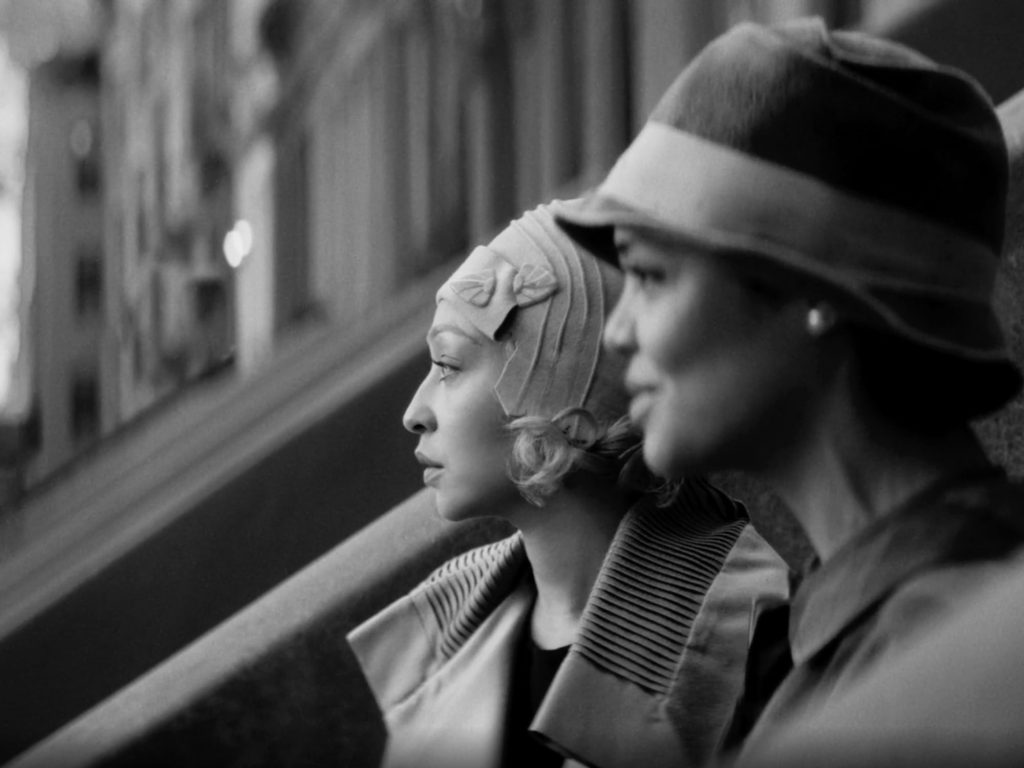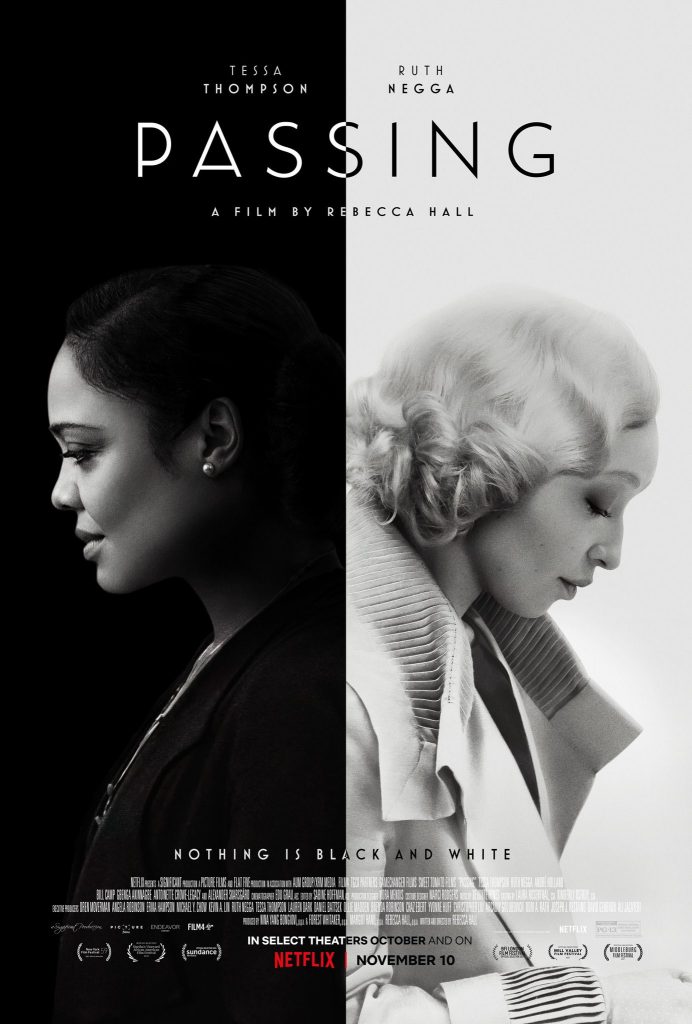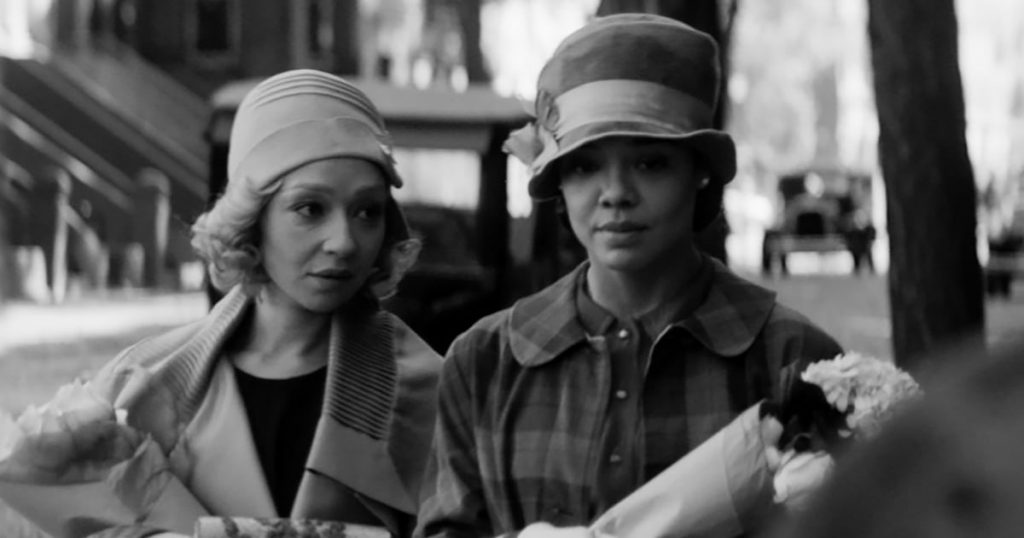In Her Directorial Debut, Rebecca Hall Brings You a Thought Provoking Tale
Rebecca Hall makes her directorial debut with this deeply personal and intimate adaption of the 1929 novel of the same name by Nella Larsen. Actress turned director, Hall blows away the audience with such a well crafted and thought provoking film that will have you thinking long after the credits have finished rolling. The film is led by the amazingly talented Tessa Thompson and Ruth Negga as Irene and Clare respectfully. The film follows the growing relationship between these two childhood friends when they happen to run into each other after having not seen each other in almost 12 years. The only hitch in their relationship is that Irene identifies as an African-American whereas Clare is light enough to “pass” as white which causes struggles in their social status and in race relations.
The Incredible Star Power On Screen
To start we need to talk about the stars of the film. Tessa Thompson gives such a beautiful and intimate performance as Irene Redfield. Irene carries so much on her shoulders, juggling being a good mother, a good wife, sole organizer of various black community events and dutiful member of society, Thompson conveys all of this stress and doubts with her calm and collected performance. While everything may seem fine on the surface, we see her always thinking about something on her mind. She is constantly seen waging some kind of internal war on how she should be feeling, how she be treated, how she should be treating those around her, and what is expected of her. The audience sees her inner turmoil quietly peering in through the way she holds herself, how she walks and in her daily routine. An amazing performance despite having little action to work with.
Thompson’s performance is elevated by the equally amazing performance from Ruth Negga. Negga plays the old childhood friend of Irene who happens to pass for white and thus was able to join high society. Married to a wealthy white man, Clare Bellew has anything and everything she ever wanted. When she runs into Irene, however, she comes to realize that she doesn’t want to be living this lie anymore. Negga captures this destructive longing excellently. She doesn’t hold back and wants what she wants no matter who might get hurt in the process. Negga’s character reminded me of the Buchanan’s and their explosive nature from The Great Gatsby. While Clare’s story doesn’t end exactly how Daisy Buchanan’s does, their spirit and desires are very similar and you can’t help but fall in love with their charm and personality. Such a fun and complex character that could only be portrayed by the magnificent Ruth Negga.
It’s with both Thompson and Negga that such a compelling story is woven together. Tessa Thompson described Ruth and her approach to tackling the roles was almost symbiotic. Neither performance could reach the intrigue and nuance that they held without each other. Both actresses were a joy to watch together and certainly carry much of the film on their own. If you are a fan of either of them you will certainly enjoy this film.
The Technical Side of This Amazing Film

The production of Hall’s Passing was a long, uphill battle as she had very strong beliefs on what the film needed to include and how it needed to be presented. The film is shown in a 4:3 aspect ratio all in black and white which both lend itself to further meaning on the film’s many topics.
As soon as the film began with the 4:3 ratio I knew exactly what Hall was trying to convey. We have Irene, mother of two and wife to a busy black doctor who sees herself as an African-American woman who needs to hide herself from the world in order to get by. Opposite her we have Clare, a light skinned woman who chooses to pass as a white woman. Her lighter skin has given her a life in high society where she can have whatever she wants. These two alternative lifestyles have forced both women into their own little boxes that they wish they could break out of. The specific aspect ratio for this film solidifies these constraints that both women have placed upon themselves and makes us, the audience, feel claustrophobic and needing to break out of these limitations.
At first glance, the black and white film seems like an obvious allusion to the fact that this film deals heavily with race in America. You’d be correct but there’s so much more to it than that. As Rebecca Hall said regarding her film, black and white isn’t truly just black and white rather it’s a million shades of gray. Nothing in this world is black and white despite how hard we try to make it so. Every action in this story has gray areas. We don’t know why Brian looked at Clare in that way, we don’t know why Hugh truly likes attending predominately black parties. We are left filling in the gray areas of this black and white film, never truly knowing if what we believe is even correct.
One can’t talk about this film without bringing up its brilliant score, or more accurately, lack of score. The film is entirely void of any backing music other than the occasional piano melody. The short little rift on the keys is used rarely and only to transition between scenes, but other than that the film has no score. This was an intentional decision from the director and it really forces the audience to really focus on the other aspects of the film like the acting, the framing of the shot, the lighting, etc. While the film has very little music accompaniment, the film makes up for it with some very impressive sound editing. The film uses loud and sudden noises from everyday life to pull the viewers and the characters back into reality.
The Joy of Not Knowing
Throughout the film we see plenty of open ended situations and dialogue that to some viewers could suggest one thing, and to others something entirely different. It’s in this inconclusiveness that makes the film shine as bright as it does. Hours after the film had concluded, I was still trying to settle on a definitive plot line that would wrap this whole movie up in a nice little bow. Even now I still can’t tell you for a fact everything that happened in this film and that’s what excites me. Talking with other’s who have had the pleasure of seeing this movie early it’s very clear that no one will look at this movie the same way. Rebecca Hall passionately spoke about how on the surface, this movie feels very much like watching something where nothing really happens, but if you lean in and think and do the work, there’s a lot more to this film than meets they eye. As I write this I am eagerly looking forward to when this film drops on Netflix so that I can watch it again. The film is so dense with information to unpack, everything from the lighting, the set design, the actor’s body language and facial expressions, that I know that during my next rewatch I will surely pick up on something new that will completely transform what I thought was happening in a given scene.
My Consensus
Overall this an extremely well crafted film by Rebecca Hall is one to check out. The incredible performances from Tessa Thompson and Ruth Negga, the thought provoking composition of the aspect ratio, the lighting and color choices, the beautiful ambiguity of the film all make for a magnificent film. I for one will be eagerly awaiting for whatever Rebecca Hall does next.

Check out Passing in select theaters only on October 27th or on Netflix when it hits the streaming service on November 10th!
Before we let you go, we have officially launched our merch store! Check out all of our amazing apparel when you click here and type in GVN15 at checkout for a 15% discount!
Make sure to check out our podcasts each week including Geek Vibes Live, Top 10 with Tia, Wrestling Geeks Alliance and more! For major deals and money off on Amazon, make sure to use our affiliate link!
Ever since I was young, I had always been fascinated in film and the work that goes into them. I love animation, blockbuster hits, indie films and everything in between. Some day I’ll have the privilege of being apart of the filmmaking process.







